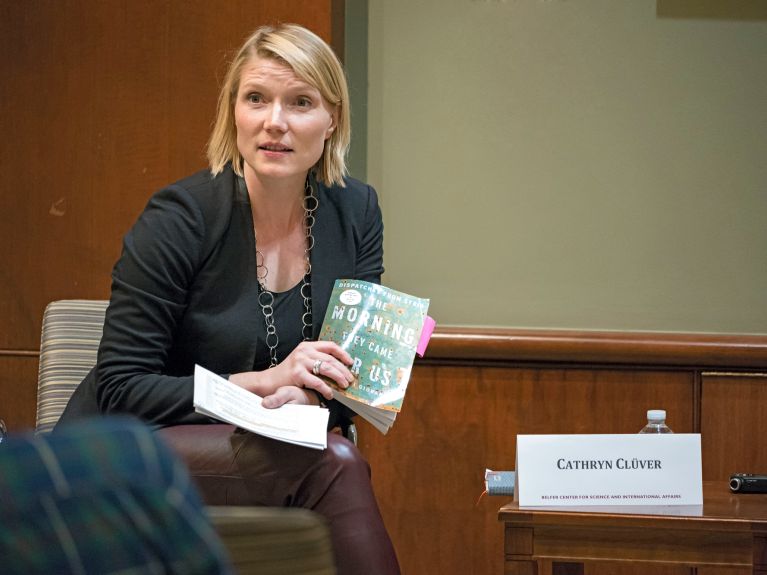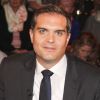Diplomacy undergoing change
What is next with regard to transatlantic relations? The political expert Cathryn Clüver Ashbrook on new foreign policy possibilities.

Ms. Clüver Ashbrook, a year ago Chancellor Merkel made her inaugural visit to President Trump. How have transatlantic relations changed recently?
We are witnessing a break in the values that define the Western alliance. The past year was disorienting for Europeans. They were unable to assess how reliable statements made by the US administration were, for example its commitment to NATO. With regard to trade and economic policy, Trump treats allies as nothing short of enemies – the tariffs imposed on steel and aluminium impact primarily on European industry. As such the President is sending out the implicit message that he is not bothered about working together, of having a common view of the rest of the world. Given the enormous challenges it is facing, I’m thinking here of China and the continued tense situation in Syria and the extended Middle East, it would be desirable for the transatlantic alliance to flex its muscles.
In the USA there is enormous interest in learning from Germans and Europeans. The scheme involving on-the-job training and part-time schooling is one example.
What can Germany do to improve the transatlantic relationship – strengthen its relations with the individual US states?
That is one of the few rays of hope. The German public and the federal institutions are beginning to realise that America is not just an administration in Washington, but 50 federal states with very different ideas about politics. It is a deeply divided country, but this division also gives rise to innovative initiatives and enormous interest in learning from Germans and Europeans, take for example the scheme involving on-the-job training and part-time schooling: What is the working world like in the 21st century, which education systems meet the challenges of globalisation? States in which German companies have been operating for years rate the model highly and want to expand it. New opportunities for collaboration are also emerging in environmental and climate policy. Lots of governors and mayors of big cities want to stick to the climate goals agreed in Paris and are looking for partners to do so. There are new investment opportunities here for European and German companies, as well as potential for new twinning agreements for cities and municipalities.
Cities as foreign policy players – that is new. Your Metro Diplomacy Initiative is picking up on this development.
We are observing how new, global twinning agreements are developing, how major cities are beginning to define their interests independently of the national or federal context, and exchanging ideas and opinions, and joining forces worldwide. Alliances such as the C40 that address environmental issues are pioneers. These new players, which were previously scarcely considered in major foreign policy strategies, are providing interesting impetus to the transatlantic relationship. When I consider these developments, I’m less worried about the future.
Diplomacy’s frame of reference now extends beyond governments and classic multilateral organisations.
The Metro Initiative is part of your Future of Diplomacy Project, in which you have been developing innovative conflict prevention tools since 2010. What is it you do exactly?
We conduct research into how the challenges of the 21st century impact on diplomacy. Its frame of reference now extends beyond governments and classic multilateral organisations. We have different negotiating situations that we used to. All manner of different networks are challenging sovereign, state, steering and decision-making capacities, and the communication and data revolution is accelerating these developments. Future generations of diplomats need to be able to handle this, while at the same time being digitally versed. Alongside political, linguistic, and economic understanding, diplomats must adapt to these new challenges; they need to be able to interpret large amounts of data in order to emerge from a permanent crisis mode.
A new way of tackling conflicts?
Conflicts in the future will be transnational and very much dependent on one another. Indeed, climate change causes natural disasters, which trigger waves of migration. The key word here is anticipatory foreign policy: Which capabilities, or which partners, do we need in government service in order to counteract the establishment of the next “Islamic State”? Which democracy movements do we support where and when? How do we prevent cross-border developments such as pandemics and environmental disasters, which in turn can affect us? What influence will Blockchain have on state secrets being kept secret? Those who develop capacities early on in a bureaucratic system can consciously counter developments such as these at an early stage. This requires a new form of training and a new approach to the shape of bureaucratic systems. That is what we are doing in the Future of Diplomacy Project.
Are foreign ministries prepared for changes such as these?
The first are recruiting experts in these fields and restructuring their bureaucracies, including the career requirements. Under Obama the State Department responded to the change in diplomacy and worked with tech companies from Silicon Valley. Interest is huge in Europe, too. I have advised ministries in Denmark and the Netherlands, as well as the German Federal Foreign Office on the matter.
How do you view the future of transatlantic relations? Do Europeans have to wait and see?
Waiting and seeing is the wrong strategy. Europeans are not doing so either, as we can see from the initiatives for a joint defence and procurement policy. It is important to spend money on this and develop visions now. If Europe can find ways and means of positioning itself more strongly and more as one when it comes to foreign policy it will provide a robust, future-oriented platform for working with the USA. Regardless of who is president.
Cathryn Clüver Ashbrook, a German-American, is the founding executive director of the “Future of Diplomacy Project” at the renowned Harvard Kennedy School in Cambridge, Massachusetts.
Interview: Christine Mattauch
